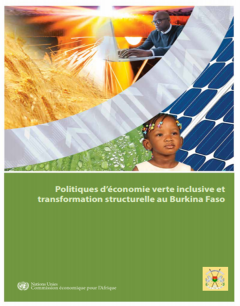
In Burkina Faso, more effective macroeconomic management based on policies to promote sustained and sustainable growth remains a priority goal. However, it is now recognized that maintaining rapid growth is not synonymous with structural transformation or a rapid reduction in poverty. To achieve the above-mentioned goals, growth must be deliberately oriented towards sustainable, inclusive development, predicated in particular on a process of agricultural modernization, industrialization tailored to national circumstances and economic diversification which creates jobs, helps to lower poverty levels and gives wider access to basic services. Accordingly, an inclusive green economy, designed in a spirit of structural transformation, is increasingly recommending itself in policy and strategy debates as the most suitable way of bringing about sustainable economic and social transformation.
This report identifies the relations between inclusive green economy policies and the structural transformation of the economy of Burkina Faso. It also examines ways in which inclusive green economy policies help to shape structural economic transformation in Burkina Faso with a view to sustainable development. The study draws on a conceptual framework which explores the place and role of inclusive green economy policies in structural transformation and sustainable development.
Burkina Faso does not have an inclusive green economy policy. However, analysis of the country’s socioeconomic and environmental characteristics shows that for there to be a lasting structural transformation, there seems to be no way other than that of an inclusive green economy.
